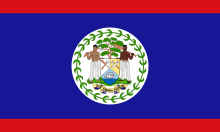 | |
| Total population | |
|---|---|
| Regions with significant populations | |
| 42,970[1] | |
| 2,146[1] | |
| 2,127[1] | |
| 1,694[1] | |
| 1,007[1] | |
| 984[1] | |
| 372[1] | |
| 344[1] | |
| 167[1] | |
| 103[1] | |
| 85[1] | |
| 46[1] | |
| 45[1] | |
| 44[1] | |
| 38,[1] 11 (2022)[2] | |
| 25[1] | |
| 54[1] | |
| 33[1] | |
| 18[1] | |
| 13[1] | |
| 13[1] | |
| 13[1] | |
| 12[1] | |
| 9[1] | |
| 50[1] | |
| 200[1] | |
| 6[1] | |
| 6[1] | |
| 5[1] | |
| 3[1] | |
| Languages | |
| Religion | |
| Christianity (Predominantly Protestants and Catholics), and minority Buddhist, Hindus, Muslims, Rastafarians, Baháʼís[3] | |
| Related ethnic groups | |
Belizeans are people associated with the country of Belize through citizenship or descent. Belize is a multiethnic country with residents of Ethnic groups of Amerindian, African, European, Asian and Middle-eastern descent or mixed race with any combination of those groups.
Colonisation, slavery, and immigration have played major roles in affecting the ethnic composition of the population and as a result, Belize is a country with numerous cultures, languages, and ethnic groups.[4][5][6]
- ^ a b c d e f g h i j k l m n o p q r s t u v w x y z aa ab ac ad "Belize - International emigrant stock". Countryeconomy.com.
- ^ "Belizeani in Italia". www.tuttitalia.it (in Italian).
- ^ "Most Baháʼí Nations (2010)". QuickLists > Compare Nations > Religions. The Association of Religion Data Archives. 2010. Retrieved 2013-08-20.
- ^ Volz, Joe and Coy, Cissie, "Belize: Central American Jewel," aarp.org.
- ^ Smith, Vicki (18 February 2007), "Belize beckons with unspoiled Caribbean isles, friendly faces, rich marine life," The San Diego Union-Tribune.
- ^ Link, Matthew R. (2002), "Central America's perfect, penny-pinching blend of island beaches, virgin rain forest, and Maya mysteries" Archived 2013-06-03 at the Wayback Machine, Budget Travel, January/February 2002.